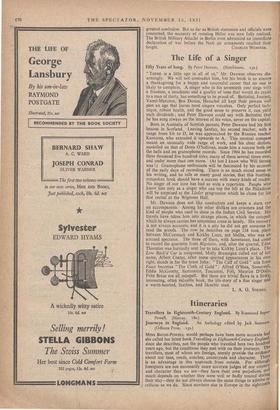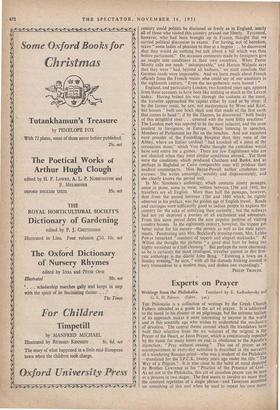Itineraries
Journeys in England. An Anthology edited by jack Simmono. (Odharns Press. iss.) MISS BAYNE-POWELL would perhaps have been more accurate had she called her latest book Travelling in Eighteenth-Century Englana, since she describes, not the people who travelled here two hundred years ago, but the conditions they met with on their journeys. The travellers, most of whom are foreign, merely provide the evidence about our inns, roads, coaches, countryside and character. Th1? is an advantage in this approach from outside. For althott8" foreigners are not necessarily more accurate judges of our countrS and character than we are—they have their own prejudices, ah much depends on whether they were well or badly treated during their stay—they do not always choose the same things to admire r!‘ criticise as we do. Since nowhere else in Europe in the eighteen
century could politics be discussed so freely as in England, nearly all of those who visited this country praised our liberty. Tyrconnel, however, who had been brought up in France, thought that we carried political discussion to excess. For having, out of boredom, taken "some ladies of pleasure to dine at a bagnio • he discovered that they would do nothing but talk about a bill which was then before parliament." On occasion comments made by foreigners give an insight into conditions in their own countries. When Pastor Moritz calls our roads "incomparable," and Horace Walpole says that they Were "bad, beyond all badness," we must conclude that German roads were impassable. And we learn much about French officials from the French visitor who could say of our ancestors in the eighteenth century, "Even the tax-gatherers were honest I "
England, and particularly London, two hundred years ago, appears from these accounts to have been like nothing so much as the Levant today. Having bribed his way through the customs at the 'coast, the traveller approached the capital either by road or by river; if by the former route, he saw, not masterpieces by Wren and Kent, but houses "built one brick thick and that made of the first earth that comes to hand "; if by the Thames, he discovered "both banks of this delightful river . . . covered with the most filthy erections." The London mob was reputed to be the most indecent, and the most insolent to foreigners, in Europe. When listening to speeches, Members of Parliament lay flat on the benches. And our ancestors were prouder of the Foundling Hospital than they were of the Abbey, where an Italian cardinal "had knocked off a piece of the coronation stone," which Von Politz thought the custodian would have sold entire for a guinea. There 'are few Englishmen who are not shocked when they meet similar conditions abroad. Yet these were the conditions which produced Chatham and Burke, and so perhaps in Baghdad or Cairo comparable ones will produce their modern counterparts. Miss Bayne-Powell neither condemns nor excuses. ' She writes amusingly, sensibly and dispassionately, and she clearly knows the period well.
In Mr. Simmons's anthology, which contains ninety passages, some in prose, some in verse, written between 1386 and 1943, the travellers are all English. More than half the passages, however, date from the period between 1760 and 1800 which, he rightly observes in his preface, was the golden age of English travel. Roads and carriages were sufficiently good to induce people to explore the country for the sake of satisfying their curiosity ; but the railways had not yet deprived a journey of all excitement and adventure. From this same period dates the now popular pastime of visiting country houses. In the eighteenth century, however, the tripper got better value for his money—the private as well as the state apart- ments. Penetrating into Mrs. Beckford's dressing-room, Mrs. Lybbe Powys remarked "numbers of superb and elegant nicknacks." At Wilton she thought the pictures "a good deal hurt by being too highly varnished in a late cleaning." But perhaps the most charming, as he is certainly the most intelligent, traveller quoted in this first- rate anthology is the diarist John Byng. "Entering a town on a Sunday evening," he says, "with all the damsels frisking around is very tremendous to a modest man, and dashes one exceedingly."
PHILIP TROWER.















































































 Previous page
Previous page